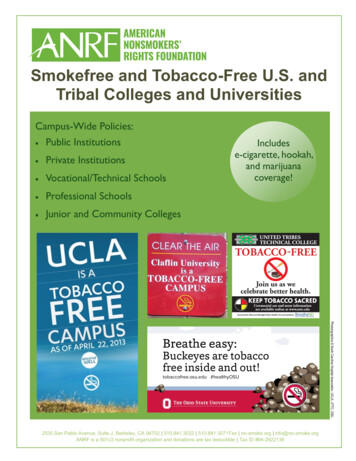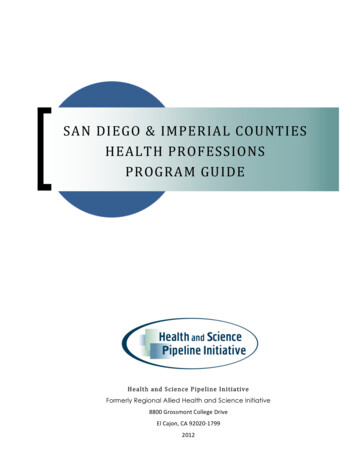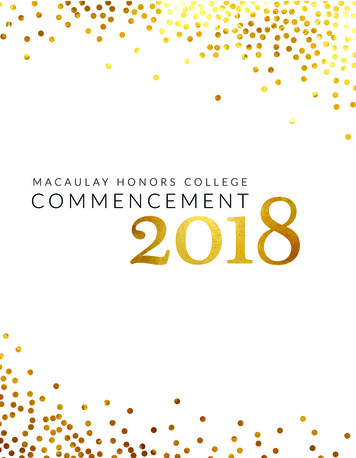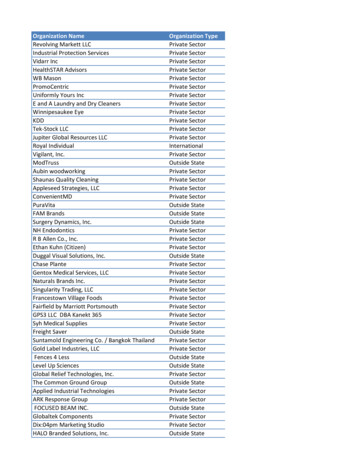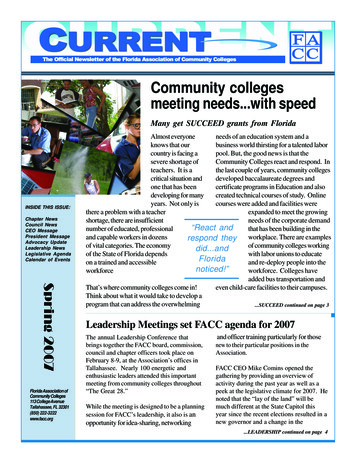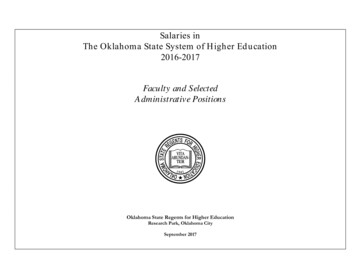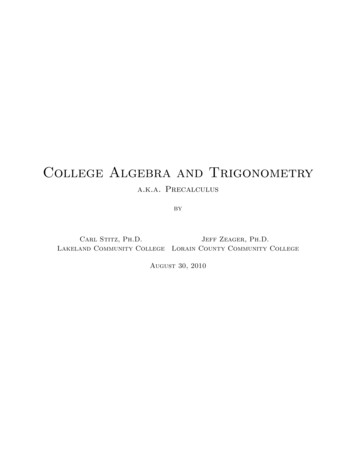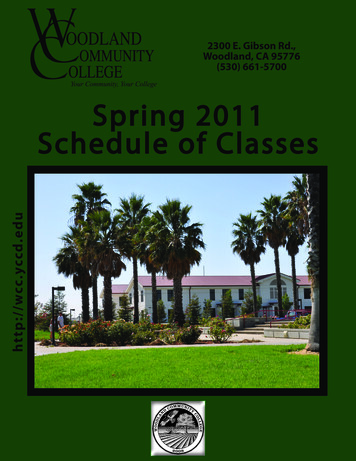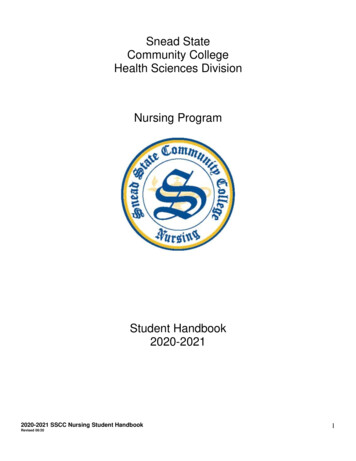
Transcription
Snead StateCommunity CollegeHealth Sciences DivisionNursing ProgramStudent Handbook2020-20212020-2021 SSCC Nursing Student HandbookRevised 06/201
INTRODUCTIONWelcome to Snead State Community College! You join a very select group of students who haveattended Snead State’s nursing program since 2004. Snead State Community College has a historyrich in tradition, and is the oldest College in the Alabama College System to award associatedegrees. We strive to promote academic excellence and are here to facilitate your learning and toprovide you with the opportunity to grow as a person, as a citizen, and as a health care worker.Snead State values every student who attends the College and respects every student’s rights andprivileges. This Student Handbook has been prepared to allow you to carefully review theopportunities, rights, responsibilities, and policies that apply to you as a nursing student. Unlessotherwise designated in a nursing course syllabus, these policies apply to each nursing course inwhich you enroll. If, for any reason, routine progression through the program is interrupted, policies inthe Student Handbook and College Catalog at the time of readmission will apply. Any revisions oraddendums to this handbook will be provided in writing to each student and will become effective atthe time specified on the written notification.Each person at the College is committed to your success – as a student, a professional, and mostimportantly, as an individual. Through evaluations and surveys, students have the opportunity to offervaluable input about our nursing program. We are committed to your success. Welcome to SneadState Community College!Nursing FacultyDee McClellan, DNP, RN - Director of Health SciencesLisa Brock DNP, RNMissy Freshwater, D. Sc., RNJessica Harp, RN, MSNAmy Langley DNP, RNLaura Liebner, RN, MSN(256) 840-4185(256) 840-4179(256) 840-4177(256) 840-4191(256) 840-4186(256) 840-4187Tammy Robison – Health Sciences Secretary(256) 840-4149 / Fax (256) 840-4158April 2017 - The Board of Commissioners voted to accept the Follow-Up Report and grant continuingaccreditation to the Associate Degree Nursing program with removal of conditions as the program is incompliance with all Accreditation Standards and Criteria reviewed. The Commission also affirmed the nextonsite accreditation review for the Spring 2022 cycle. (The Accreditation Commission for Education in Nursing,Inc. (ACEN) 3343 Peachtree Road NE – Suite 850, Atlanta, GA 30326)Equal Opportunity Policy: It is the policy of the Alabama State Board of Education and Snead StateCommunity College, a postsecondary College under its control, that no person shall, on the grounds of race,color, disability, sex, religion, creed, national origin, or age, be excluded from participation in, be denied benefitof, or be subjected to discrimination under any program, activity, or employment.2020-2021 SSCC Nursing Student HandbookRevised 06/202
PROGRAM INFORMATIONSTATE APPROVALSnead State Community College’s Nursing program is fully approved by the Alabama State Board of Nursing.MISSIONThe mission of the nursing programs of the Alabama Community College System is to prepare graduates to practice safe,competent, patient-centered care in an increasingly complex and rapidly changing health care system. We seek toprovide full and equal access to opportunities for educational success to meet the community needs.PHILOSOPHYWe believe that nursing is a dynamic profession, blending science with the use of evidence-based practice and clinicalreasoning and the art of caring and compassion to provide quality, patient-centered care.We believe learning is an interactive process in which faculty and students share responsibility to meet programoutcomes. We believe in using educational methods that are current and supportive of students in the teaching andlearning environment, with the presentation of information from simple to complex.Nursing is guided by standards of practice and standards of professional performance. Standards reflect the values andpriorities of the nursing profession. Therefore, we have integrated competencies from the Quality and Safety Educationfor Nurses (QSEN) and National League of Nursing (NLN) into our philosophy as part of our core values.COMPETENCIES/LEARNING OUTCOMESNLN competencies for nursing are central to the conceptual framework. The related QSEN competencies for graduatenurses define the knowledge, skills and attitudes that the graduate nurse should possess to continuously improve thequality and safety of the healthcare systems within which they work. (QSEN)Human Flourishing- Advocate for patients and families in ways that promote their self-determination, integrity, and ongoinggrowth as human beings. (NLN def)Patient-Centered Care – Recognize the patient or designee as the source of control and full partner in providing compassionateand coordinated care based on respect for patient’s preferences, values, and needs. (QSEN def)Nursing Judgment- Make judgments in practice, substantiated with evidence, that integrate nursing science in the provision ofsafe, quality care and that promote the health of patient within the family and community context. (NLN def)Safety – Minimizes risk of harm to patients and providers through both system effectiveness and individual performance.(QSEN def)Informatics – Use information and technology to communicate, manage knowledge, mitigate error, and support decisionmaking. (QSEN def)Professional Identity- Implement one’s role as a nurse in ways that reflect integrity, responsibility, ethical practices, and anevolving identity as a nurse committed to evidence-based practice, caring, advocacy, and safe, quality care for diverse patientswithin a family and community context. (NLN def)Teamwork and Collaboration – Function effectively within nursing and inter-professional teams, fostering opencommunication, mutual respect, and shared decision-making to achieve quality patient care. (QSEN def)Spirit of Inquiry- Examine the evidence that underlies clinical nursing practice to challenge the status quo, questions underlyingassumptions, and offer new insights to improve the quality of care for patients, families, and communities. (NLN def)Evidence-based practice – Integrate best current evidence with clinical expertise and patient/family preferences and values fordelivery of optimal health care. (QSEN def)Quality Improvement – Use data to monitor the outcomes of care processes and use improvement methods to design and testchanges to continuously improve the quality and safety of health care systems. (QSEN def)2020-2021 SSCC Nursing Student HandbookRevised 06/203
ACCS Conceptual Framework2014The conceptual framework derived from the philosophy forms a basis for the organization and structure of the nursing curriculum. This framework serves as aguide for nursing instruction in the attainment of student learning outcomes.The framework consists of concepts that encompass the qualities of a successful graduate nurse. NLN competencies were chosen because they specificallydefine the competencies of the graduate Associate in Applied Science Degree Nurse. QSEN competencies reflect current contemporary practice. Conceptsinterlace NLN and QSEN competencies to achieve the goal of providing graduate nurses with the tools needed to provide holistic care to in an ever changinghealth care delivery system. Each competency includes knowledge, skills and attitudes to serve as a basis for consistent performance expectations acrossacademic and practice settings.
The Snead State Community College Nursing Faculty believe that we have the responsibility for contributing to SneadState's mission and instructional goals. The mission of the Snead State Community College Nursing faculty is to providequality nursing education for Associate in Applied Science Degree Nursing students who desire a career in nursing.THE ALABAMA COLLEGE SYSTEM - NURSING PROGRAM OUTCOMES1.2.3.4.Performance on Licensure Exam – The most recent licensure examination pass rate will be at least 80% for allfirst-time test-takers during the same 12-month period.Program Completion – At least 60% of the students admitted will graduate within 150% of the time of the statedprogram length beginning with the first required nursing course as delineated below: Associate in Applied Science Degree Nursing – Eight semesters LPN to RN Mobility – Five semestersProgram Satisfaction At least 80% of graduates responding to the graduate survey distributed within one year after graduationwill indicate satisfaction with the program. At least 80% of employers responding to the employer survey distributed within one year after graduationwill indicate satisfaction with the program.Job Placement – At least 80% of the graduates seeking employment will be employed one year after graduationin a position for which the program prepared them.Associate in Applied Science Degree Nursing (ADN) - Generic optionThe Associate in Applied Science Degree Nursing (ADN) program is a five-semester program. The ADN curriculumincludes content that allows students to attain knowledge and understanding of the prevention of illness; maintenance,promotion and restoration of health; safe and effective care environment; and psychological integrity of individuals acrossthe life span. Critical thinking, nursing process, communication, safety, client education, ethical-legal issues, healthillness, growth and development, current trends in health care, and pharmacology are core themes used to developcontent within the curriculum. The ADN curriculum incorporates general education courses along with the nursingcourses. The nursing courses include classroom instruction, campus laboratory, and clinical experiences in varied healthcare facilities.Completion of the Associate in Applied Science Degree Nursing Program leads to the awarding of the Associate inApplied Science degree. Following graduation, the student may be eligible to take the National Council of State Boards ofNursing Licensure Examination-RN (NCLEX-RN) and to apply for a state registered nurse license. Fees for theexamination and the license are set by the testing and licensing authorities and are the responsibility of the student.Mobility LPN to ADN ProgramThe Mobility LPN to ADN program provides opportunity for the LPN to obtain an Associate in Applied Science Degree.This program allows qualified LPNs to enter the fourth semester of the ADN curriculum upon successful completion ofNUR 209 - Concepts for Healthcare Transition and complete the program in three semesters. Following graduation, thestudent may be eligible to take the National Council of State Boards of Nursing Licensure Examination-RN (NCLEX-RN)and to apply for a state registered nurse license. Fees for the examination and the license are set by the testing andlicensing authorities and are the responsibility of the student.2020-2021 SSCC Nursing Student HandbookRevised 06/205
ADMISSION REQUIREMENTSA student who seeks admission to the nursing program must satisfy certain requirements beyond those imposed onstudents seeking admission to other SSCC programs. These requirements differ so that students have an adequateacademic background that will give the greatest opportunity for success in a complex curriculum that progresses in asequential order. Admission to the College does not guarantee admission to the nursing program. Applicants areadmitted to the Associate in Applied Science Degree Nursing (ADN) program annually in the fall. Applicants to the MobilityLPN to Associate in Applied Science Degree Nursing program are admitted in the Spring. Applicants should consult with anursing advisor well in advance of the date they plan to apply for admission to the nursing program to allow time to meetthe admission requirements. Students are selected for admission into the ADN program based on academic performanceand the number of slots available. Meeting minimum requirements does not guarantee acceptance into the program.Since class size is limited, students with the strongest academic record will be selected. Applicants will be notified, inwriting, of acceptance into the ADN program.Minimum admission standards for the Associate in Applied Science Degree Nursing (ADN) Program include1.Unconditional admission to Snead State Community College.**Students must apply for general admission to SSCC prior to the application deadline.**2.Receipt of completed application packet before the deadline of May 15th at 4:00 p.m. - Applications received afterdeadline will not be considered.3.A minimum of 2.50 GPA (calculated based on grades earned in Pre-Nursing general education courses) forstudents with previous college work.4.A minimum of 2.50 high school GPA for students without prior college work (GED acceptable in lieu of high schooltranscript).5.ACT with a minimum composite score of 18 prior to application. No expiration date on ACT scores for nursingapplication purposes.6.Eligibility for English 101 and Math 100 (College Algebra or higher) as determined by College policy7.Good standing with the College.8.Meeting the essential functions required for nursing throughout the program.Minimum admission standards for the Mobility PN to Associate in Applied Science Degree Nursing (ADN) Programinclude1.Unconditional admission to Snead State Community College.**Students must apply for general admission to SSCC prior to the application deadline.**2.Receipt of completed application packet before the deadline of October 1st at 4:00pm. - Applications receivedafter the deadline will not be considered.3.A minimum of 2.50 GPA (calculated based on grades earned in Pre-Nursing general education courses)4.ACT with a minimum composite score of 18 prior to application. No expiration date on ACT scores for nursingapplication purposes.5.Meeting the essential functions required for nursing throughout the program.6.Have completed the following courses with a grade of “C” or higher: ENG 101 English Composition MTH 100 Intermediate College Algebra or Higher Level Math course BIO 201 Human Anatomy and Physiology I BIO 202 Human Anatomy and Physiology II PSY 210 Human Growth and Development SPH 106 or 107 Speech7.Possess and maintain a current, active, and unencumbered Alabama LPN license.GraduationTo receive an Associate in Applied Science Degree in Nursing a student musta) File an application for graduation with the Office of Student Servicesb) Clear all obligations with the Collegec) Complete the 66 credit hours required in the ADN curriculum2020-2021 SSCC Nursing Student HandbookRevised 06/206
Lab Credit HoursClinical Credit HoursWeekly Clinical ContactHoursTotal Credit 9741113619TotalProgram First SemesterNUR 112 – Fundamental Concepts of NursingMTH 100 (or Higher)BIO 201 – A&P ISecond SemesterNUR 113 – Nursing Concepts IENG 101 – EnglishPSY 210 – Human Growth and DevelopmentBIO 202 – A&P IIThird SemesterNUR 114 – Nursing Concepts IINUR 115 – Evidence Based Clinical ReasoningSPH 106 or 107 – SpeechFourth SemesterNUR 211 – Advanced Nursing ConceptsBIO 220 – General MicrobiologyFifth SemesterNUR 221 – Advanced Evidence Based Clinical ReasoningHumanities Elective (Philosophy Preferred)Five Semester Contact Hour TotalTotal Associate Degree Contact HoursNursing Theory 315Nursing Lab 135Academic Theory 345Academic Lab 120Nursing Clinical 675Total Contact Hours 1590660255675Weekly Total Contact HoursWeekly Theory Contact HoursTotal43310ACCS NURSINGCONCEPT BASEDCURRICULUMWeekly Lab Contact HoursTheory Credit HoursSTANDARD ASSOCIATE IN APPLIED SCIENCE DEGREE NURSING CURRICULUM1590Total Associate Degree Credit HoursCourse Area Theory Lab Clinical TotalNursing2131539Academic234027Total4471566SNEAD STATE COMMUNITY COLLEGE - APPROVED HUMANITIES ELECTIVESENG 251 - American Literature IENG 262 - English Literature IIREL 100 - History of World ReligionsENG 252 - American Literature IIPHL 106 - Introduction to PhilosophyREL 151 - Survey of the Old TestamentENG 261 - English Literature IPHL 206 - Ethics and SocietyREL 152 - Survey of the New Testament2020-2021 SSCC Nursing Student HandbookRevised 06/207
CAREER MOBILITY – LPN TO ASSOCIATE IN APPLIED SCIENCE DEGREE NURSING CURRICULUMClinical Credit HoursWeekly Clinical Contact HoursTotal Credit HoursWeekly Total Contact HoursFirst Semester (Spring I)NUR 209 – Concepts for Healthcare Transition Students*Nontraditional Credit Hours awarded after completion of NUR 209TotalSecond Semester (Fall)NUR 211 – Advanced Nursing ConceptsBIO 220 – General MicrobiologyTotalThird Semester (Spring II)NUR 221 – Advanced Evidence Based Clinical ReasoningHumanities Elective (Philosophy Preferred)TotalProgram TotalWeekly Lab Contact HoursTotalLab Credit HoursPrerequisite CoursesENG 101 – EnglishMTH 100 (or Higher)BIO 201 – A&P IBIO 202 – A&P IISPH 106 or 107 – SpeechPSY 210 – Human Growth and DevelopmentWeekly Theory Contact HoursACCS NURSINGCONCEPT BASEDCURRICULUMTheory Credit HoursCAREER MOBILITY –LPN TO ASSOCIATE IN APPLIED SCIENCE DEGREE NURSING 1012012307310661531877*Upon completing NUR 209 with a grade of 75% or higher, LPN to RN Mobility students will be awarded fifteen (15) nontraditional hours of credit in addition to the ten (10) credit hours for the NUR 209 course.SNEAD STATE COMMUNITY COLLEGE - APPROVED HUMANITIES ELECTIVESENG 251 - American Literature IENG 262 - English Literature IIREL 100 - History of World ReligionsENG 252 - American Literature IIPHL 106 - Introduction to PhilosophyREL 151 - Survey of the Old TestamentENG 261 - English Literature IPHL 206 - Ethics and SocietyREL 152 - Survey of the New Testament2020-2021 SSCC Nursing Student HandbookRevised 06/208
Snead State Community CollegeDepartment of Health SciencesEstimated Program CostsTUITION & FEESTuition costs may vary for online coursesRN Tuition (Resident) General ed. courses Nursing coursesRN Total (Resident) 4,0505,850 9,900SUPPLIES & EQUIPMENTBooks 1500Laptop (For electronic resources) 1000Uniforms*We recommend that students purchase two sets 150Lab Coat 40Patches 10Hose/Socks 20Shoes 50Watch 20Stethoscope 20Lab Kit 165Sphygmomanometer 20Scissors 5Penlight 5Physical Exam/Immunizations/TB testing 550Drug Screening 70Background Screening 40Liability Insurance 20Standardized Testing 900Graduation/Pinning Costs (Due last semester)Nursing PinNursing LampABN Exam FeeTemporary LicensureNCLEX ReviewNCLEX ExamGraduation PhotosTotal Supplies & Equipment2020-2021 SSCC Nursing Student HandbookRevised 06/20 60 20 50 150 350 250 50 5,5159
THE ALABAMA COLLEGE SYSTEM NURSING EDUCATION PROGRAM PROGRESSION POLICYPROGRESSIONIn order to continue in the nursing program, the student must:1.Achieve a grade of C or better in all required general education and nursing courses.Grading scale for nursing coursesA 90-100%B 80-89%C 75-79%D 60-74%F 59% and below2.Be accepted by clinical agencies for clinical experiences.3.Maintain ability to meet essential functions for nursing with or without reasonable accommodations.4.Maintain program health requirements.1.2.3.4.A total of two unsuccessful attempts in two separate semesters (D, F, or W) in the nursing program will result indismissal from the program.A student may be reinstated to the nursing program only one time. The reinstatement is not guaranteed due tolimitations in clinical spaces. All nursing program admission standards must be met.A student must have a 2.0 cumulative GPA at the current institution for reinstatement.If a student has a documented extenuating circumstance that should be considered related to a withdrawal orfailure, then this student may request a hearing before the Admissions Committee or other appropriate collegecommittee for a decision on repeating a course or readmission to the program.DEFINITIONSReinstatement: Students who have a withdrawal or failure in a nursing course and are eligible to return to that course willbe considered for reinstatement to the program.Readmission: Students not eligible for reinstatement may apply for program admission as a new student and must submitall application criteria. If accepted as a new student the student must take, or retake, all nursing program courses.PROCESS FOR REINSTATEMENT1.Students should first schedule an appointment with the Director of Health Sciences to discuss eligibility forreinstatement.2.Students must apply for reinstatement to the nursing program and submit the application with ACT test resultsand Snead State transcript by published deadline. Reinstatement application should be received by theappropriate date based on the following deadlines: Fall - June 1 at 4 p.m.; Spring - October 1 at 4 p.m.; andSummer - February 1 at 4 p.m.3.Students must apply for readmission to the college if not currently enrolled. College readmission must beaccomplished by published deadline.4.Update immunizations, CPR, drug testing, and background screening according to program policy.5.Demonstrate competency in previous course(s) as required by the College’s nursing program.6.Students must successfully complete the program within 150% of the time of the stated program length beginningwith the first nursing course as delineated below: Associate in Applied Science Degree Nursing – Eight semesters LPN to RN Mobility – Five semestersTRANSFER POLICYThe transfer policy applies to students desiring to transfer between Alabama Community College System institutions. Itdoes not apply to students wishing to transfer from other institutions.Criteria for Transfer1.Must meet minimum admission standards for the nursing program.2.Must possess a grade of C or better in all nursing program required courses taken at another institution andpossess a minimum of a 2.0 cumulative GPA at time of transfer.3.Dean/Director of previous nursing program must provide a letter of eligibility for progression in previous nursingprogram.2020-2021 SSCC Nursing Student HandbookRevised 06/2010
4.5.6.7.Must comply with all program policy requirements at accepting institution.Complete at least 25% of the nursing program required courses for degree at the accepting institution.Must meet acceptability criteria for placement at clinical agencies for clinical experience.Acceptance of transfer students into nursing programs is limited by the number of faculty and clinical facilitiesavailable. Meeting minimal standards does not guarantee acceptance.TRANSIENT STUDENT POLICYThe transient policy applies only to students desiring to transfer between Alabama Community College Systeminstitutions. It does not apply to students wishing to transfer from other institutions.Criteria for Transient Status1.Must meet minimum admission standards for the nursing program.2.Must possess a grade of C or better in all nursing program required courses taken at another institution andpossess a minimum of a 2.0 cumulative GPA.3.Dean/Director of previous nursing program must provide a letter of eligibility for progression in previous nursingprogram.4.A student enrolled at another institution must secure permission from that institution by submitting an applicationfor admission to the College and a Transient Student Form completed by an official (Nursing ProgramDean/Director) of the primary institution.5.Transient students must complete a Transcript Request Form at the end of the term before a transcript will beissued to the primary institution.6.Must comply with all program policy requirements at accepting institution.7.Must meet acceptability criteria for placement at clinical agencies for clinical experience.8.Acceptance of transient student into a nursing program is limited by the number of faculty and clinical facilitiesavailable. Meeting minimal standards does not guarantee acceptance.DOSAGE CALCULATION EXAMAll students – including transfer, reinstatement, mobility and generic track – are required to pass a Dosage CalculationExam prior to administering medications in clinical. Students will be given two attempts to score 90% or above. Failure toachieve a grade of 90% or higher will result in lack of progression in the nursing program.ADMINISTRATIVE WITHDRAWAL/DROPA student may be dropped administratively from any course for (1) falsification of application and/or records (2) failure tofulfill other conditions of admissions and/or registration; (3) failure to comply with student conduct standards; (4) failure toattend class(es); and (5) failure to comply with “Standards or Scope of Practice” as established by the Alabama Board ofNursing or other regulatory or licensing agencies for programs of study in the Health Sciences Division.LICENSURE INFORMATION FOR RNUpon satisfactory completion of the requirements of the nursing program, the graduate will be eligible to apply to the StateBoard of Nursing for licensure as a nurse. Legal requirements for licensure in Alabama may be found in the AlabamaAdministrative Code, 610-X-4. Applicants who have been found guilty of any offenses listed in the Code may be deniedlicensure by the Alabama Board of Nursing, State of Alabama, Montgomery, Alabama, 36130. For more information, visitthe ABN website at www.abn.alabama.gov/laws/#tab-code.The nursing student shall comply with legal, moral and legislative standards, in accordance with the Alabama LawRegulating Practice of Registered and Practical Nursing as stated below:“The Board shall have the power to deny, revoke, or suspend any license issued by it or to otherwise discipline a licenseeupon proof that the licensee is guilty of fraud or deceit in procuring or attempting to procure a license; has been convictedof a felony; is guilty of a crime involving moral turpitude or of gross immorality that would tend to bring reproach upon thenursing profession; is unfit or incompetent due to the use of alcohol, or is addicted to the use of habit-forming drugs tosuch an extent as to render him or her unsafe or unreliable as a licensee; has been convicted of any violation of a federalor state law relating to controlled substances; is mentally incompetent; is guilty of unprofessional conduct of a characterlikely to deceive, defraud or injure the public in matters pertaining to health or has willfully or repeatedly violated any of theprovisions of this article as defined by board rules and regulations.”2020-2021 SSCC Nursing Student HandbookRevised 06/2011
NURSING PROGRAM ENROLLMENT REQUIREMENTSStudents have direct contact with patients and other health care workers in affiliated health care agencies; therefore, theyare expected to have and maintain a satisfactory level of health, including freedom from chemical dependency andcommunicable diseases. Students must be able to fully participate in the approved program of classroom studies andcampus and clinical laboratory experiences and responsibilities.Students, upon diagnosis of communicable disease(s) (i.e., chicken pox, measles, flu, etc.) must contact the clinicalinstructor immediately. Based on current medical knowledge, the instructor will make judgment of communicability andadvise the student regarding attendance.The 1993 Alabama Infected Health Care Worker Management Act mandates that any health care worker infected withHuman Immunodeficiency Virus (HIV), Hepatitis B Virus (HBV), or Hepatitis C Virus (HCV) that performs an invasiveprocedure or any physician caring for an Infected Health Care Worker (IHCW) notify the State Health Officer of theinfection.Students entering nursing must be aware that they may be exposed to various contagious diseases during their clinicaleducation and career. Precautions to be taken are outlined in the introductory patient care courses. Additionalinformation may be provided by each clinical facility. Students are required to use available protective devices and to usestandard (universal) precautions.After students are accepted for admission into the nursing program the following requirements must be met: Current health questionnaire completed by a licensed physician, nurse practitioner, or physician’sassistant indicating that an applicant is in satisfactory mental and physical health and is free of anyinfectious disease. The form must be submitted prior to attending the first clinical rotation. The form isvalid for two years. (Form provided by school) Current CPR certification (American Heart Association – Basic Life Support for Healthcare Providersor American Red Cross – CPR/AED for the Professional Rescuer) prior to first clinical rotation. Thiscertification must remain current throughout the program. Documentation of immunizations including TB test - The following are required at the student’sexpense: documented MMR vaccine with proof of immunity (positive titer) to MMR(Measles/Mumps/Rubella), documented Varicella (Chickenpox) disease or Varicella vaccine with proof ofimmunity (positive titer), documented evidence of Tetanus immunization within 10 years, annual Influenzavaccination (due by November 15th), and Hepatitis B vaccine series with proof of immunity (positive titer).(Student must receive the first vaccine prior to attending the first clinical rotation.) The Hepatitis Bvaccine is a series of three injections. The second injection must be received one month after the initialvaccination; the third injection must be received six months after the second vaccination. In addition, atwo-step TB skin test (PPD) is required for all students enrolling in the nursing program. A two-step TBskin test consists of administering a second TB skin test one week following the read date of the firstinjection. For students with a previous positive TB skin test, proof of
Snead State Community College’s Nursing program is fully approved by the Alabama State Board of Nursing. MISSION The mission of the nursing programs of the Alabama Community College System is to prepare graduates to practice safe, competent, patient-centered care in an increasingly complex and rapidly

